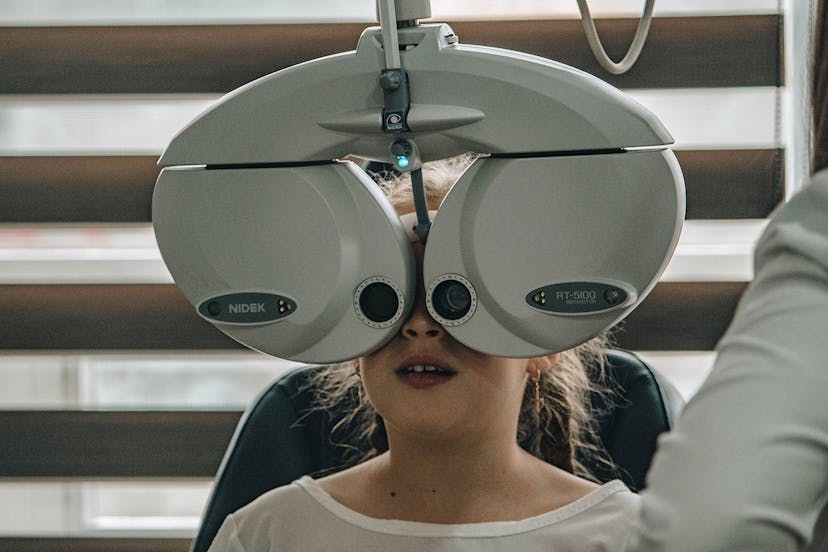
Sunlight And Sight: Nurturing Children's Vision Through Daylight
Put Your Children In The Light!
Sunlight plays a pivotal role in promoting and maintaining the optimal health of children's eyes. Exposure to natural sunlight is a key source of vitamin D, which is crucial for overall eye health. Vitamin D helps regulate calcium absorption, contributing to the development and maintenance of healthy eyesight. Furthermore, exposure to sunlight early in the day has been linked to the regulation of the circadian rhythm, influencing sleep patterns and promoting a well-balanced sleep-wake cycle. Adequate sleep is vital for children's overall health, and it indirectly supports their eye health by reducing the risk of eye strain and fatigue.
Moreover, natural sunlight exposure is essential for the development of visual functions in children. Natural light provides a more comprehensive and balanced spectrum of light compared to artificial lighting, aiding in the development of visual acuity and depth perception. Spending time outdoors exposes children to varying light intensities and distances, allowing their eyes to adapt and strengthen. The interplay of light and shadows outdoors also enhances their ability to focus, track moving objects, and distinguish between different shapes and colours, all of which contribute to the overall well-being of their eyes. Embracing the significance of daylight in a child's routine fosters a foundation for robust eye health and development.
A Deficiency In Sunlight
Insufficient exposure to sunlight in children can have notable consequences for their eyes. A primary concern is the potential impact on the development of myopia, commonly known as nearsightedness. Research suggests that spending more time indoors and less time outdoors, where sunlight is abundant, may contribute to an increased risk of myopia in children. Additionally, a lack of sunlight exposure can lead to a deficiency in vitamin D, which plays a vital role in maintaining optimal eye health. This deficiency may result in conditions such as dry eyes, inflammation, or an increased susceptibility to eye infections.

Recent Research
Recent research highlights the importance of outdoor exposure in reducing the risk of myopia (short-sightedness) in children. Studies indicate that spending at least two hours a day outdoors can significantly lower the likelihood of developing myopia. This protective effect is attributed to exposure to natural light, which plays a role in healthy eye development. For instance, research using smartwatch data found that children spending over 150 minutes daily in moderate outdoor light (about 5000 lux) experienced slower progression toward myopia onset source: The Guardian.
In London, organisations like the Association of Optometrists emphasise the importance of early eye tests and outdoor activities for maintaining children's vision health. Vision problems affect about 20% of school-aged children, many of which are undiagnosed. Ensuring regular outdoor play and protecting children's eyes with quality sunglasses are recommended strategies source: Association of Optometrists.
These findings underscore the importance of incorporating outdoor activities into children’s daily routines, especially in urban settings like London.

A Positive Link
Research suggests that engaging in outdoor activities and specific sports, such as ball games, may contribute to reducing the progression of myopia in children. Ball sports like tennis, table tennis, and baseball demand quick eye movements, focus adjustments, and spatial awareness, which could help enhance visual skills. However, while these activities may support overall eye health, they are not proven to reverse existing myopia significantly.
Studies indicate that increased time spent outdoors, often a byproduct of engaging in sports, reduces myopia risk. This benefit is primarily linked to exposure to natural light, which increases dopamine levels in the retina, a factor that slows eye elongation (a key cause of myopia progression). Moreover, reducing near-work activities, such as excessive screen time, alongside outdoor physical activity, is critical in managing myopia.
Although sports like table tennis and basketball improve hand-eye coordination and visual response times, these benefits are more about maintaining good visual function rather than reversing myopia. Structured outdoor activities may serve as part of a holistic strategy for eye health, particularly in young children prone to myopia progression.
Further Reading on these studies.
Our Top 20 Outdoor Activities For Children
Here are 20 fantastic activities for children to enjoy in the daylight:

- Outdoor Scavenger Hunt: Create a list of items for kids to find in nature.
- Sidewalk Chalk Art: Let their creativity flow on the pavement.
- Nature Exploration: Take a nature walk to observe plants, insects, and animals.
- Bike Riding: Enjoy a ride around the neighbourhood or in a nearby park.
- Picnic in the Park: Pack a lunch and spend quality time outdoors.
- Bubble Blowing: Kids love chasing and popping bubbles in the sunshine.
- Water Balloon Fight: A classic and refreshing activity on a warm day.
- Soccer or Kickball: Organize a friendly game with friends or family.
- Gardening: Teach kids about plants by letting them dig and plant flowers or herbs.
- Nature Art: Use leaves, flowers, and sticks to create beautiful art pieces.
- Flying Kites: Watch as colourful kites soar in the open sky.
- Cloud Watching: Lay on a blanket and identify shapes in the clouds.
- Obstacle Course: Set up a course with cones, hula hoops, and jump ropes.
- Outdoor Storytime: Read books together under a shady tree.
- Rock Painting: Decorate rocks with vibrant colours and patterns.
- Outdoor Yoga: Introduce kids to the benefits of yoga in a natural setting.
- Plant a Tree: Teach environmental responsibility by planting a small tree.
- Nature Journaling: Encourage kids to document their outdoor experiences.
- DIY Bird Feeders: Create simple bird feeders and watch feathered friends visit.
- Stargazing: As the day turns to night, explore the night sky and identify constellations.
These activities not only provide entertainment but also promote physical activity, creativity, and a connection with the natural world.
FAQs On Safe Sunlight Exposure For Children
- How much sunlight should my child get daily?
Research suggests children should spend at least 2 hours outdoors daily for optimal eye health and to reduce the risk of myopia. - Is there a best time for outdoor play?
Early morning and late afternoon are ideal, as sunlight is less intense and UV exposure is minimised compared to midday hours. - Do sunglasses protect children’s eyes?
Yes, sunglasses with 100% UV protection are crucial. Look for the CE mark or labels indicating compliance with British Standard BS EN 1836:2005. - Can too much sunlight harm my child's eyes?
Yes, prolonged exposure to strong UV light without protection can cause eye damage, such as cataracts or macular degeneration later in life. - What should I do if my child doesn’t like wearing sunglasses?
Try lightweight, comfortable frames or hats with wide brims for shade. Gradually introduce sunglasses as a habit. - Does sunlight exposure indoors through windows have the same benefits?
No, most windows block UVB rays needed for vitamin D production and the full benefits of natural light. - Can cloudy days still provide enough light for eye health?
Yes, outdoor light is beneficial even on cloudy days. The intensity is still much higher than typical indoor lighting. - How can I protect my child’s eyes during winter?
Snow reflects UV light, so sunglasses are essential even in cold months. Encourage outdoor play, especially when sunny. - Are there risks of myopia in urban environments like London?
Yes, urban children often have less outdoor time and higher rates of myopia. Prioritise daily outdoor play to mitigate risks. - Is sunscreen necessary near the eyes?
Yes, but avoid applying too close to the eyes to prevent irritation. Use child-safe sunscreen and pair with sunglasses and hats for full protection.

Enhanced Myopia Knowledge
Here are some useful research papers and articles related to the impact of exercise on vision health, especially in children and adolescents:
- "Network meta-analysis of the efficacy of physical exercise interventions on vision health in children and adolescents" – This study systematically evaluates the impact of different physical activities, such as badminton and table tennis, on vision health. It highlights the significant role of physical exercise in preventing and mitigating myopia in children. The research points out that badminton and table tennis were particularly effective in enhancing vision health.
- "Effects of physical activity on visual health in children and adolescents" – This paper reviews multiple studies that explore how physical activity impacts myopia prevention and management. The research underscores the importance of outdoor activities and exercises like table tennis and badminton for improving visual health Frontiers.
- "Physical activity and vision in youth: A systematic review" – A meta-analysis focusing on how various physical activities impact myopia development and its progression. It emphasises that regular physical exercise, including specific sports like badminton, can help slow down myopia progression in children and adolescents MDPI.
These papers provide evidence supporting the role of exercise in improving vision health, particularly in preventing myopia in younger populations.
Visit My-iClinic
If you're concerned about your vision or noticing changes in your eyesight, it’s important to get an eye test from a trusted professional. At My-iClinic, our London-based eye clinic offers comprehensive eye tests and advanced treatments tailored to your individual needs. Whether you're experiencing difficulties with your vision, managing myopia, or just due for a routine checkup, our team is here to help. Book an appointment today and take the first step towards visiting the No1 London family eye clinic.
Find out more by Speaking to our team









